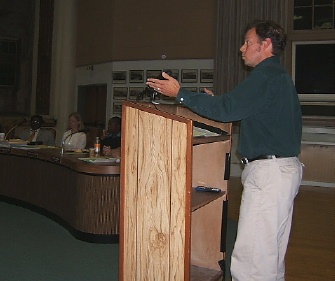 |
|
Gas Relievers



Chris Marchand. File photo
By Sharon Bass
Those gas-guzzling Crown Victorias in the town car fleet might soon start getting the bump by fuel-efficient Honda Civic hybrids.
And at least the first four shouldn’t cost the town an extra dime -- even though hybrids cost a lot more dimes than regular gas-propelled cars. A Honda Civic goes for about $16,000; the hybrid version, $22,800.
Chris Marchand, Hamden’s new grants coordinator, secured a $27,200 alternative fuel vehicle grant from the state to pay the difference between four standard vehicles and four hybrids. The legislative Finance Committee approved to accept the grant on Monday. Next Tuesday the full Council will vote on it.
“It’s a step in the right direction for the town because other municipalities are doing it,” said Marchand, who works in Economic and Community Development. “The state of Connecticut has just purchased a huge fleet of hybrids.”
“As fleet manager I think it’s a good idea for the town to use fuel-efficient cars,” said Art Giulietti, also the town’s risk manager.
Hybrids have both a gas engine and an electric-powered motor which work together to increase fuel economy, said Marchand. “Say you’re idling at a stop sign or cruising along the highway and don’t need all the power, the electronic engine supplements partly or completely” takes over for the gas engine.
“We’re using retired police cars, Crown Victorias, which get 10 gallons a mile around town,” he said, and hybrids get 40-50 miles a gallon in the city. “We’ll save significantly in fuel costs.” Cops will still need conventional cars because they’re more powerful, the grants coordinator said.
September 28, 2006
Money Movement

Flanagan. File photo
Councilman Flanagan wants to wrest some fiscal control from the mayor
By Sharon Bass
From 1967 to 2000, Hamden mayors had to get Council approval to move money from one capital project to another. That rule changed when former Mayor Carl Amento came on board.
Now Flanagan wants to put the control back into the Council’s hands -- and his peers appear to agree. On Sept. 25, the Administration Committee voted 6-1 to amend the 15 or 16 “multi-project” ordinances to reflect that desire. Councilman Curt Leng was the dissenting vote. Other committee members are Berita Rowe-Lewis, Carol Noble, Bob Westervelt, Matt Fitch and Betty Wetmore The full Council is expected to vote on the ordinance change next Tuesday at 7 p.m.
“An ordinance was passed six years ago for expediency sake,” said Flanagan. “I don’t care what the amount of money is [being transferred]. It’s the procedure. We oversee the administration of the town.”
He said the power switch didn’t work very well under Amento. A phone message left for the former mayor was not returned.
“Monies got moved and projects didn’t get done,” said Flanagan. “And not small amounts of money either.”
An elevator and new heating system were needed at the Keefe Center during Amento’s tenure, the 2nd District councilman said, but were never done. Both were just completed. “The wall was falling down [at Keefe]. Just little things,” Flanagan said and chuckled.
“Now every mayor in the future is going to have to come back to the Council any time they want to move monies between capital projects and explain why.”
In an e-mail reply, Leng explained his opposition to Flanagan’s motion.
"The ordinance proposed my [sic] Councilman Flanagan was in response to the previous Administration's abuse of the rule that allowed the transfer of money from one capital account to another internally. I agree, the Amento Administration did abuse this regulation,” Leng wrote.
"However, the new ordinance is so strict that it stops the flow of government and doesn't allow the Town to keep progress moving forward on our projects. A simple example - if the council approved $50,000 in roof repairs for a fire department as part of a million dollar bond ordinance - and the following bid for the repairs came in at $51,000 - the Town would have to halt the repairs for up to 3-4 weeks until the next Council meeting to re-approve the repair.
“That is not allowing for reasonable progress,” Leng continued. “I wanted an allowance for small adjustments that are needed for day-to-day governing - perhaps allowing the Town to transfer $10,000 or $25,000 as a maximum. As it stands, the ordinance could slow important projects like public safety and school improvements."
But Flanagan argues it’s more important to have that check and balance over the mayor than to push projects through as quickly as possible.
“There is never a reason for a municipal project to be rushed. Ever,” he said. “It gives the Council and the taxpayers assurances that once money is assigned to a project it will stay there. The mayor would have to come back with a good reason to move the money. That’s the way it always worked.”
Flanagan said he expects his motion to pass.
September 27, 2006
‘It’s the Taj Mahal'

Harvey Slauson (left) and Jack Barletta in front of their new mobile castle.
Transfer station gets new old digs; employee calls for tougher residency enforcement
Story and photos by Sharon Bass
Jack Barletta can’t say enough great things about an old trailer that was just moved to the Hamden Transfer Station on Wintergreen.
His gratitude comes from having worked out of an even older and much smaller trailer for years. One that was not very suitable for mankind. “This thing [pointed to former trailer] was infested with every bug and termite,” Barletta said.
The trailer on lower Dixwell Avenue that housed a police substation and animal control officers was moved to the transfer station in mid-September to replace the 10-foot-by-36-foot ramshackle one. The newer and improved trailer is 24 by 52.
Mayor Craig Henrici said it will cost between $3,000 and $5,000 to pay for the moving and installation. Acting Fire Marshal Brian Badamo struck a deal with Konover Construction, builders of the new middle school, to move it, the mayor said. Public Works employees worked overtime to set it up. Henrici said he hasn’t gotten a bill.
“I’m glad the employees like it,” he said. An RFP (request for proposal) had been issued to relocate the trailer, with proposals coming in at $30,000, said Henrici. So the $3,000-$5,000 price tag was a good deal, he said.

One of few things moved from the old trailer to the new old trailer.
Barletta said the mobile gift has boosted the morale of the four male employees who toil at the station -- which seems to be in New Haven but is apparently on Hamden soil. “We’re going to have a fully functioning kitchen,” he said. “We don’t usually go out to lunch.” In the older old trailer, there was just a hotplate and small refrigerator. The new old one has a sink, making meal preparation and cleanup possible.
Two Concerns
The discarded trailer, waiting to be hauled away, was broken into five or six times over the last five years, Barletta said. So the new one has been equipped with an alarm system, which has yet to be activated.
But the biggest dilemma over at the station is nonresidential dumping.
“I hate to say it, but up to 50 percent come from New Haven,” the operator said. To gain entry, one only needs to show proof of Hamden residency. “And all that means is somebody in the vehicle needs a Hamden [driver’s] license,” he said.
“The transfer station is a perk for living in Hamden,” said Henrici. “Other towns are more restrictive.” He said he plans to come up with a “more structured system” to combat nonresidential use. But it won’t happen overnight.
“We have other things on the table so it’s not a burning issue,” he said. “But we recognize that it’s a system that’s easily beaten.”
The transfer station was created in the 1990s, shortly after the dump on the site was capped and closed.
“There’s a lot of people coming from out of town,” said Public Works Director John Busca. Although he said some are legit. Commercial vehicles -- registered in or out of town -- carting stuff like brush and tree logs from Hamden properties can use the station by purchasing a permit for $20 to $60, depending on the size of the truck.
Barletta has ideas for cracking down on scofflaws. One is to send free station vouchers in folks’ tax bills, which would have to be used to gain entry. In Branford, where he lives, residents can get a sticker for five bucks to use the shoreline town's transfer station and beaches.
-----------------------------------------------------------------
From Capt. Ron Smith:
Acting on a complaint from the management of Town Walk Apartments, the Hamden Police Selective Enforcement Team found tenants of unit 2132 growing marijuana on their balcony. The search and seizure was conducted Sept. 25.
Police seized 48.5 grams of marijuana plants, approximately 27 grams of ground marijuana and $350, and arrested two teens.
Maliky Kebe, 19, of 2132 Town Walk Drive. He was charged with possession of marijuana, conspiracy to possess marijuana, cultivation of marijuana and conspiracy to cultivate marijuana. Kebe was detained on a $2,500 bond, with a Meriden court date of Oct. 10.
A 17-year-old male was also charged with possession of marijuana, conspiracy to possess marijuana, cultivation of marijuana and conspiracy to cultivate marijuana. He was detained on a $2,500 bond and expected in Meriden court on Oct. 10.
Pay Back
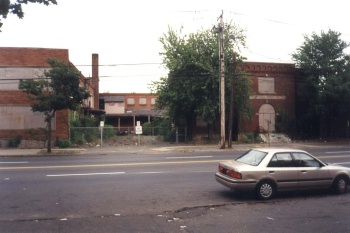
Apartments for artists and shops for kitchy businesses are slated for this blighted Highwood site on Dixwell Avenue. File photo
Nonprofit buys town property, town wants to give most of the money back
By Sharon Bass
Last Oct. 6, the Legislative Council approved the $335,000 sale of the blighted Johnson Building property on Dixwell Avenue to a nonprofit to create an artist colony of sorts.
Last night, a Council committee grilled Economic Development Director Dale Kroop about why he was asking to have $318,000 put back into the Mutual Housing Association of South Central Connecticut project.
First of all, Kroop said the money would go into the Highwood Revitalization Account, which has been bone dry for two years. No money would go to MHA. About half the loot would be earmarked for streetscape improvements -- building wide sidewalks, planting trees, etc. -- as part of the ongoing streetscape project on lower Dixwell. The other 50 percent would fund some of the site work -- drainage, parking, excavation -- and $16,750 would go toward Kroop’s salary. He said the money is needed to be eligible for a matching $750,000 state grant the New Haven nonprofit is applying for. The housing/retail project, however, would be for profit.
“Will the money go to other parts of Highwood?” asked at-large Councilwoman Betty Wetmore. Kroop told her no. But said that the artist colony is larger than just the Johnson Perfume property at 953-965 Dixwell Ave.
MHA plans to build 27 affordable apartments for artists, and 15,000 square feet of retail and gallery/performing arts space. The agency also bought the building next door from the Highville Mustard Seed Corporation for $240,000; and 110 Columbus Ave. for $225,000.
“I’m very much in support of this project, but I didn’t realize all the Highwood fund [would be put] into this one project,” said 3rd District Councilwoman Berita Rowe-Lewis. She said she wants to see more streetscaping on Dixwell, not just in front of the Johnson building.
“The reason we need to subsidize the project is to keep housing and retail rents affordable,” said Kroop. Otherwise, corporate chains like CVS -- "Which is what we don't want," he said -- would move in because they can afford high rents and to foot infrastructure improvements, while many independent businesses cannot.
All committee members but 8th District Councilman Mike Germano voted to return the money to the project. The full Council will make the final decision next Tuesday. (The regular legislative meeting has been bumped from Monday because of Yom Kippur.)
“I thought it was a lot of money to reinvest back into the project,” Germano explained his dissenting vote. He also said the infrastructure work should be put out to bid before a dollar amount is determined. Kroop said if there’s leftover money it would return to the Highwood fund.
----------------------------------------------------------------
Marijuana-related arrests --14
Cocaine-related arrests -- 4
Heroin-related arrests -- 3
Liquor offenses -- 1
Miscellaneous arrests --14
The above arrests include threatening, interfering with an officer, engaging an officer in pursuit, operating under suspension, warrant service, recovered stolen vehicle and reckless driving.
In addition, the SET has seized:
Cocaine -- 28.2 grams; street value $1,410
Heroin --1.1 grams; street value $82.50
Marijuana -- 137.5 grams; street value $2,748
Pills (oxycontin) -- street value $160
(percoset) -- street value $1,120
(suboxone) -- street value $60
(morphine) -- street value $200
Cash -- $9,644
Weapons -- one sawed-off shotgun, two Remington shotguns, one Ruger rifle.
Information courtesy of the Hamden Police Department.
Here Come the Contracts
By Sharon Bass
Four long-anticipated labor contracts are ready to go to the Legislative Council for ratification, but the town’s guardian services agreements are still on the drawing board. Hamden cops recently voted down their contract, while the Fire Department’s is almost ready.
“We believe these settlements are just and fair, both for the workers we represent and the citizens we serve every day,” said Larry Dorman of Council 4 of AFSCME, which represents the Town Hall locals as well as the library union, which is still in contract arbitration.
“The settlements all contain reasonable general wage increases and an agreement to establish a labor-management committee to conduct a job evaluation,” he said. The details of the contracts cannot be divulged until they are Council-approved.
Mayor Craig Henrici said he was basically satisfied with the outcomes but did not elaborate.
Town labor attorney Chris Hodgson said the holdup on the fire contract is “a language issue.” Gary Merwede, president of Hamden Professional Firefighters Local 2687, said he wasn’t ready to comment. And Henrici said he didn’t know why the police rejected their proposal. “It’s one issue and I don’t know what it is,” he said.
Pension plans for all employees are in a separate agreement. Most plans still have two to three years of life left. But there are certain retirement provisions exclusive to police and fire that are currently being ironed out, said Hodgson.
And this year, for the first time health coverage was carved out of the labor contracts.
-------------------------------------------------------------------
By Sharon Bass
The tug-of-war that began in January between two unions over Town Hall supervisors has ended. The state labor board has ruled for Council 4 of AFSCME and against UPSEU.
Council 4, which represents the supervisors Local 818, claimed although the contract had expired a couple of years ago, it was in negotiations with the town and therefore there was no window for the election UPSEU hoped to have to add 818 to its portfolio.
The board made the decision Sept. 13. “Our goal in establishing the rules regarding window periods is to help ensure that the parties do not allow the process lapse indefinitely with no opportunity for employees to exercise their rights … Preserving an atmosphere undisrupted by a competing petition is an equally strong goal of our rulings in these cases. [T]he Town and Council 4 were actively engaged in the process and as such, UPSEU’s petition is untimely,” the labor board wrote.
“I wasn’t really surprised,” said Wayne Gilbert of UPSEU (United Public Service Employees Union). “It’s the supervisors who lost out here. All AFSCME did in denying them a vote was to delay it. All AFSCME did was extend it one year and deny their members a vote.”
Gilbert said he’s determined to capture 818. Next January he plans to petition the state again. The supervisors’ contract expires June 30, 2007.
By Sharon Bass
About eight financial types told the Legislative Council last night why bonding the pension fund is a good idea. They spoke on the mayor’s request.
“Were you brought in to sell the product?” asked Council President Al Gorman after Mike McKinnon of IBIC, “an independent non-banking advisor,” extolled the benefits.
McKinnon said bonding pension funds has been popular since the early 1990s. West Haven, Bridgeport and Naugatuck have bonded their retirement accounts, he said.
“West Haven is in the worst financial straits,” said at-large Councilwoman Betty Wetmore.
McKinnon, reps from UBS Investment Bank and Finance Director Mike Betz explained how pension obligation bonds (POBs) work. And why they’re good for Hamden.
According to Betz, actuaries say the town’s pension fund should have $250 million to cover current and future retirees. It has about $82 million and the annual payout is about $13 million. So Mayor Henrici has suggested bonding $85 million to plug up about half of the un-funded liability hole. McKinnon used the figure $80 million for his presentation.
He said the rate of return on the pension account would go from 5.9 percent to 8 percent with $80 million in bonding. However, Councilman Jim Pascarella pointed out that interest rates are not predictable.
“Is it a safe assumption that we’d have an 8 percent return in 30 years?” he said, the life of the bonds.
“That’s the most important question,” said Omar Daghestani of UBS. Eight percent is, I would say, by far the norm.”
Pascarella pointed out the stock market dive in the early ’90s when the rate of return was minus 10. Investment interest (or rate of return) and town and employee contributions feed the retirement account.
Since the world of high finance is filled with speculations and gambles, the figures tossed out yesterday evening in Council Chambers were not precise. Could not be precise. For instance, the stock market could take another dive or crash.
William Woollocott of The Segal Company said in order to get an 8 percent return, 60 percent of the POBs would have to go into stocks and the rest into safer investments like bonds.
“So the assumption is justified,” he said. “Can I guarantee it? No!”
It was also unclear whether the annual amount the town puts into the pension fund would be less with an infusion of POBs, which are invested internationally. This year $9 million was budgeted for the account, while the actuaries recommended $13 million.
“I keep hearing this is for budget relief, but we still have to put in $12 million or $15 million,” said Wetmore.
The annual debt service payment would rise with POBs; it’s currently $11.7 million a year on $110 million of debt. And there would only be a total of $45 million left for capital improvement projects from 2007 through 2012 with $80 million of bonding. The Town Charter does not allow debt service to exceed 10 percent of the annual budget -- $163M this fiscal year -- which is why only part of the un-funded pension liability is being considered for POBs. In order to go over the 10 percent, a referendum vote is needed.
According to Betz, there would be an additional cost of roughly $1.2 million for advisors and others to handle the POBs. He said the town is considering a new financial advisor but would not disclose the name.
State Restraints
If the Council approves the bonding, the town would no longer have a choice in how much it puts into the fund. A new state law dictates a minimum amount for municipalities that take the POB route. There’s no wiggle room.
“We effectively lose our flexibility,” said Pascarella.
Of the Council people who asked questions -- Pascarella, Kath Schomaker, Betty Wetmore, Curt Leng, Gorman and Ron Gambardella -- only Gambardella spoke positively. The others said they were open-minded but concerned about the impact of borrowing $80 million or $85 million if the financial scenario doesn’t play out as the experts described.
“People who are on pensions want safer investment,” said Gorman. “In effect, the town might lose $80 million in a risk that would affect a lot of people.”
“It’s a technique that’s been used by wealthy as well as average communities,” said McKinnon.
“POBs are not a tool of last resort,” said Daghestani.
With many of the town’s labor contracts -- including police and fire -- currently being renewed, Pascarella asked if the POB talk should be put off until retirement terms are known in order to more accurately predict the financial future.
“Doesn’t it make sense to wait to know future obligations?” he said.
“I don’t know if it’s a good idea or not,” said Woollocott.
But Gambardella said if the new contracts have reduced pension benefits -- which they’re expected to -- it would “only improve” the outlook. (The police recently voted down its proposed contract; the Fire Department’s is nearly done and three AFSCME contracts are good to go, Henrici said. They need the approval of the Council, which is expected to discuss the contracts at its Sept. 25 committee meetings.)
“I think the administration is giving us some interesting strategies but as of tonight I remain skeptical, based on two main concerns,” Leng said after the meeting. “If we do this we dramatically lower our ability to do capital projects, such as police and fire stations. Second concern is the lack of flexibility we’d have in our annual budget. If there’s any kind of hit to the market we might have to put in $15 million, which would require a tax hike.”
By Sharon Bass
After the Legislative Council solidly voted against phasing in the new property revaluations, Mark Sanders headed to the Tax Assessor’s Office.
One thing in particular bothered Sanders, who leads Hamden Homeowners for Tax Relief. According to the Council’s expert tax witnesses at the Sept. 5 meeting, Hamden would lose PILOT money (payment in lieu of taxes) the state sends for private college and state-owned buildings if a phase-in was enacted.
Sanders didn't buy it. So he rifled through assessement documents last week, crunched the numbers and said the town would actually gain roughly $1.1 million in PILOT funding under a three-year phase-in. He also learned that a five-year phase-in is legal. So yesterday he e-mailed the new info to Councilman Curt Leng, asking him to reconsider the measure. Leng chairs the Finance Committee.
“My argument is PILOT is off the table, so you no longer have that excuse,” said Sanders. “That was a consistent refrain at that meeting. I couldn’t sleep at night because I knew it wasn’t right. So I had to look at the numbers myself.”
He did, and Leng said his eyes have reopened.
“I think the PILOT information was probably the most intriguing part of the letter,” said Leng. (Read his response to Sanders for more details.)
Town administrators didn’t sound too thrilled yesterday upon learning that the phase-in effort has not died. It’s not been proven how many homeowners would save money or how much they’d save. What’s clear is businesses’ tax bills would jump under a phase-in, lessening the tax burden for some homeowners. Last March, the administration talked about a phase-in.
"This is possibly one of the starkest shifts," said Betz, of the increased residential share of the town's tax bill since the reval. "We're talking about [the phase-in] and researching it."
That was six months ago.
“We’ve spent significant time discussing and evaluating a phase-in,” Mayor Craig Henrici said yesterday. “I don’t mean to be flippant, but that train has left the station.”
Finance Director Mike Betz agreed.
“I’ve already looked into it and they [state Office of Policy and Management] said we’re going to get less” PILOT money, he said.
Besides, Betz said, “We’ve already told them that the tax system can’t handle it.” He was referring to statements given by Tax Collector Barbara Tito and Tax Assessor Jim Clynes at the Sept. 5 session. “The budget has already been adopted. It’s an effective document.”
Leng said he’d present Sanders’ new PILOT findings to town tax officials and the OPM, and if the answers swing Sanders’ way he’d consider putting the item on his committee agenda again. Also, he said he would need to find out if the Munis computer system upgrade -- expected to be completed by next March -- “has the ability to process a phase-in retroactively and mid-year.”
Sanders said 87 percent of homes went up 60 percent or more as a result of last fall’s reval. It is believed by both sides -- HHTR’s and the town’s -- that those hit with 60 percent or higher hikes would benefit from a phase-in. At least during the first year.
“I don’t believe you can predict savings past the first year,” said Leng. “It could switch from $300 [savings] to $25 in the second year because we don’t know all the different variables,” such as state and other revenue and the size of future budgets.
Mark’s Methodology
On June 13, the Carleton Street attorney presented his version of a phase-in to the Council. Sanders used the simpler of two state formulas that allow for such a measure. The town used the more complicated version, which indicated less savings than Sanders'.
“The [PILOT] calculations they were doing during the [Sept. 5] Council meeting were based on an incorrect formula. They were basing it on change of assessments. They assume that the PILOT grant was based purely on assessment,” said Sanders. “It’s not that simple. You have to analyze the amount of tax those entities [state and college real-estate property] would have paid if not exempt.”
On state-owned buildings, Hamden gets 45 percent on the tax dollar in PILOT money; for private colleges it’s 77 percent, he said. “You can’t look only at the assessment. You have to look also at the mil rate. PILOT is based on assessed value times the mil rate.”
Sanders said he based his PILOT conclusions on the 10 highest assessed college-owned (Albertus Magnus, Yale and Quinnipiac) and state-owned properties.
“I added up the old assessments, pre-revaluation, and then I added up the new assessments, and I performed the same phase-in analysis on those properties as I have on hundreds of homes and businesses,” he said.
For instance, Quinnipiac’s main campus at 275 Mt. Carmel Ave. went from $73,637,70 to $85,600,550. That’s No. 1 on the college list.
“As soon as I saw that the colleges’ assessments had gone up aggregately 18.6 percent, that the state was going to owe us a lot more money,” said Sanders. State-owned buildings went up 41.3 percent, he said. While home assessments jumped an average 89 percent with the reval.
Of the top 10 state properties, the lowest on the list is 635 Wintergreen Ave., which went from $499,590 to $969,220; in the middle is 825 Hartford Turnpike, $3,522,820 to $4,820,840; and No. 1 is 180 Pine Rock, $12,112,870 to $14,457,100.
Under a phase-in, Sanders said his calculations show the town would get 87,000 more PILOT dollars for state property, and $1,078,875 more on college land because their assessments would rise, as would the mil rate.
“It’s not just a random sample. I consciously picked out the top 10 assessed values. I didn’t just pick 10 Quinnipiac properties at random,” he said.
Asked why he’s pushing for something the town has adamantly been against and the legislative body has soundly turned down, he said he thinks his new info could sway some Council members.
“I actually do think [a phase-in] is going to go somewhere. I think [the new PILOT figures] will make a difference for some Council people. I think some of the number crunchers on the Council will see this is a win-win for the town,” said Sanders.
“I also believe some of the Council people who are beginning to become skeptical of the administration will realize the administration really shot from the hip on this one, and did a disservice to the Council by trying to lead them to believe we would lose money under the PILOT programs with phase-in.”
Dear Mark and the Hamden Homeowners for Tax Relief:
Thank you for your letter and the new information it provides. I really applaud you and the Hamden Homeowners for Tax Relief's efforts to help Hamden residents with this flawed reval process. Your organization's research raises some important questions.
As you know, I have been a supporter of the concept of the Phase-In and the 2-Tier tax system since day one. I was even forced to vote against the Town budget and the Tax Rate because of the inability to offer some level of relief.
At our last Council meeting, I voted against the matter of Phase-In in response to our Tax Department [sic] and Finance Department's professional recommendation that there could be serious ramifications to this year's budget - perhaps putting us in deficit. .
In addition to PILOT totals, our tax collection rate was also of very serious concern to me and the slightest of problems could explode into a million dollar deficit of [sic] worse.
As you can understand, knowingly putting the Town's budget in risk of deficit would be a dereliction of our Council's sworn duties and was the reason that most voted, with frustration, against the Phase-In.
On initial review, I do not necessarily agree with the overall “5-Year” savings number, because I think it is much more complicated to evaluate the future effects of budgets that we have no specifics for (i.e. [sic] undetermined total budget expenditures, undetermined grant revenue levels, undetermined new tax incentive laws, etc.).
That being said, the new “retro-activity” aspect of the law is intriguing. I believe that we need to give additional analysis to the potential effects of the law's changes and the effect that the changes would have on our PILOT grants and our Tax Department Collection Rate.
To this end, I have sent a memo to Chief Assessor Jim Clynes with a request for a list of all PILOT producing property, their value and what the Town receives in cash from the State for each. I also asked for him to comment on your new information.
I have also sent a memo addressed to the Finance Director asking for his comments on the new information. In addition, I am asking that the Finance Director request a written formal opinion from the State of Connecticut Office of Policy and Management regarding the PILOT issue and any other related Phase-In information they can provide.
Finally, and possibly most importantly, I have sent a memo to the Administration asking if the “retro-activity” aspect of this law would allow for the Town to implement some type of Phase-In when the Town computer system upgrade is complete. This would, among other things, answer the very important tax collection rate issue. I will also ask for the Administration to respond to the new information.
If the Town can bring additional funds in to our budget from the State from increased PILOT grant funds, this would be a tremendous development. Any non-tax revenue that we bring in means tax relief for all residents - every year.
The "retro-activity" issue has opened some new questions that deserve answers. I pledge to research the information, including the questions that I pose in this letter and additional questions that are sure to develop over the coming weeks fully and report back to the Hamden Homeowners for Tax Relief on my discoveries.
Depending on the answers received, I will give serious consideration to adding the new Phase-In regulations to the Finance Committee for questions and answers, additional debate and perhaps another vote. As you are probably aware, bringing a matter back to a Committee that has already been defeated by the full Legislative Council would not be allowed with our Standing Rules (I am going to double check this matter aspect).
However, if new information provides for a potential vote on a new proposal, it is my belief that I could add the item to an agenda.
My decision will be based solely on firm information - how much money will be increase/decrease [sic] in grant funds, what are the new ramifications to Tax Collection, does the Town's new computer finance system give us capabilities thought impossible under the 20-year old system we were working with and other questions that come along with the additional research.
My desire to help our residents, especially our seniors and lower income families, is very strong. If we can responsibly implement some type of relief, I will support the effort. I will share information that I receive with you and the HHTR over the coming weeks.
Again, I thank you for your efforts and for providing the new information to me. I will share you [sic] letter with the members of my Committee this week.
Best Regards,
Councilman Curt Leng
Finance Committee Chairman
councilmancurtleng@sbcglobal.net
September 18, 2006
By Sharon Bass
The regional sewer board just toughened up its collection act. There’s a reported $6 million in unpaid bills.
“Hamden is just as guilty or as innocent as anyone else,” said Dominick DiGangi, executive director of the Greater New Haven Water Pollution Control Authority, a merger formed last year between Hamden, New Haven, East Haven and Woodbridge.
Last Tuesday, the GNHWPCA board of nine approved a new collection policy but is uncertain when it will go into effect.
“Unfortunately it’s going to take some time because we have to adapt our computer billing system,” DiGangi said.
Unfortunately for the sewer authority, but undoubtedly not for those with overdue accounts.
Here’s the scoop:
-
Bills will be payable within 10 days. Currently it’s 45 days.
-
If payment is not received in 30 days, a reminder notice goes out (that doesn’t happen now). And interest charges will begin at 30 instead of the current 120 days.
-
At 60 days, another notice is mailed. Failure to pay could result in the account being turned over to a collection agency. The customer is responsible for all collection fees.
-
At 90 days, accounts are automatically turned over to a collection agency. “And the collection agency does whatever it needs to do,” said DiGangi.
-
If a bill exceeds $1,000, the individual’s property can be foreclosed. The average household bill is $40 to $50 quarterly, he said. But a commercial tab can reach $1,000 monthly. However, most of the delinquent accounts are residential.
DiGangi said customers who pay their bills subsidize those who don’t because sewer usage fees are increased to compensate. The GNHWPCA takes in $24 million a year.
-------------------------------------------------------------------
From Capt. Ron Smith:
On Sept. 15, members of the Hamden Police Department Street Crime Unit and Neighborhood Interdiction Unit conducted a narcotics investigation. Officers made two motor vehicle stops, after the vehicles attempted to elude police. The investigation led to the execution of a search and seizure warrant at 21 Plaza Terrace, apartment E, Hamden. Police seized a sawed-off shotgun, heroin, crack cocaine, Percosets and marijuana. The street value of the drugs is estimated at $2,300.
Seven people were arrested; five reside in Hamden:
James Regan, 54, of 21 Plaza Terrace, apartment E, Hamden. Regan was charged with possession of a sawed-off shotgun, possession of narcotics, possession of marijuana and possession of drug paraphernalia. He was detained on a $10,000 bond and given a Sept. 28 court date.
Emily Regan, 22, of 21 Plaza Terrace, apartment E, Hamden. Regan was charged with possession of narcotics and possession of drug paraphernalia. She was detained on a $5,000 bond and given a Sept. 28 court date.
Katherine Werdan, 26, of 21 Plaza Terrace, apartment E, Hamden. Werdan was charged with possession of narcotics and possession of drug paraphernalia. She was detained on a $5,000 bond and given a Sept. 28 court date.
Thomas Bernadino, 28, of 4 Belmont St., Hamden. Bernadino was charged with possession of drug paraphernalia. He was detained on a $250 bond and given a Sept. 28 court date.
Zachary Clark, 22, of 25 Hawthorne Ave., Hamden. Clark was charged with interfering with a police officer, engaging an officer in pursuit and reckless driving. He was detained on a $2,500 bond and given a Sept. 28 court date.
September 15, 2006
By Sharon Bass
In the town’s never-ending saga of fiscal woes and whys, comes the latest chapter. The Legislative Council will tackle a new woe with likely a lot of whys next Tuesday. It’s Mayor Craig Henrici’s idea to bond $85 million of the slender pension fund.
“I would just ask all of them to keep an open mind. If they don’t think it’s the right thing to do … ” he said. However, he said he doesn’t think there are many “reasonable options.” The Sept. 19 informational meeting will start at 6:30 p.m. in Council Chambers. The public is invited but cannot speak.
At-large Councilman Ron Gambardella has advocated bonding the pension. But most others on the legislative board, like at-large Councilwoman Carol Noble, say they’re troubled by it and have a lot of questions. This would be a first for Hamden.
The town’s actuary suggested putting $14 million into the retirement account this fiscal year, said Henrici. But $9 million was approved, which was $6 million more than the year before. He said the actuarial recommendation is to keep $250 million in the fund. There is currently $82 million. And the mayor wants to bond about half of the unfunded liability. The reason he's not looking to bond the other half is because the Town Charter does not allow debt service (payments on the total town debt) to exceed 10 percent of the annual budget, without a people’s referendum. This year’s budget is $163 million. On the current debt of approximately $110 million, the debt service payout is $11.7 million. It can't exceed $16.3M, which would happen if the entire pension hole was bonded.
However, even though the fund is low, it still makes payday. Six hundred and forty town retirees are paid a collective $13 million a year.
With or without the bonding, the mayor said the recommended pension infusion is certain to rise in ’07-’08. “You can bet it’s going to be considerably more than $14 million,” he said. If bonded, the increase would likely be smaller, but the town’s debt service payment would go up.
September 13, 2006
The Making of the Green

The site of the new Town Center Park-to-be at Meadowbrook.
Story and photos by Sharon Bass
What do a psychologist, a bunch of politicians, a law student and a Realtor have in common?
C’mon. It’s easy. They’re making Hamden her first town green on what’s left of Meadowbrook.
“Perhaps a refreshment area. Everything is pretty much up in the air. The feeling is we want to keep it open space. We don’t want to clutter it up with things that won’t appeal to the general population of the town. They’re talking about a farmer’s market certain days of the week,” he said.
And they’re talking strictly passive recreation. There will be no playing fields on the town green. Instead, committee members are discussing a half-mile walking loop, an outdoor theater, a playground, community gardens, a farmers' market and transforming the rectory barn that used to sit behind Centerville Lumber into a children’s museum -- in addition to the items Westervelt mentioned.
Park Committee Chair Matt Fitch said the first phase should be done by next summer, and the remainder by summer ’08. The town recently issued an RFP for a design professional. Three proposals came back. According to Purchasing Agent Judi Kozak, Vollmer is asking for $152,500; Milone and MacBrrom $29,000; and Ferrero Hiton $23,000. The cost of the entire project was not available.
“These proposals were not comparing apples to apples, and each vendor included or excluded different things,” she said.
“In the grand scheme of things, it’s not going to be a gigantic ticket item,” said Fitch. The town will foot most or all of the bill, depending on whether grants can be obtained. “We have to do what we can afford. We want to do it right the first time,” he said.
Public Input?
“We’ve actually had quite a bit of public input already,” said Council President Al Gorman. The public is invited to the park committee meetings, he said, although they are not well publicized.
Actually, the committee wasn’t formed to solicit public suggestions, said Gorman. But rather to sift through ideas residents have thrown out over the last several years. “There was a large meeting over a year ago where verbal suggestions were recorded,” he said.
The idea for a town park dates back to the Clayman Administration. “At that time we got a lot of grief from the golfers,” said Gorman. “People want open space. They really don’t want it cluttered with a lot of things.”
Kozak, who appointed three residents to a committee panel to go over the proposals, said the park “sounds so Norman Rockwell, which is the way I picture Hamden. I feel this way only by reading the proposal and not having any input into the ideas. To me, it represents everyone in Hamden in one way or another.” She said she will moderate the panel, but will have no input or voting rights.
The stump dump on Meadowbrook will have to be removed. Gorman said the town is currently negotiating terms with the state Department of Environmental Protection.
An Eye on Kids
The Council president pointed out that the proposed ice rink would not be a Cadillac.
“It would not be huge. This is not to substitute for hockey games. This is for grandfathers” and their grandchildren, he said.
The rink would be something like a tarp covered with frozen water. In warm seasons, it would be moved away and replaced by a fountain with waterspouts at varying heights that go off at different times. “It’s a very young kid’s interactive thing,” said Gorham. “That will probably be the most expensive thing we put in there.”

A new children’s museum for the new town green? The cool red barn at Meadowbrook.
The old red barn will likely stay at the park’s entrance and become a children’s museum, money allowing. Gorman said an outdoor theater is also a possibility. But nothing fancy.
“We’re not doing Shakespeare at the park. This is children’s theater,” he said.
“We have to make it a place where people would want to congregate. It should be a place where people can hang out, read. Get something to eat. We’re not going to have a restaurant but some place where you can grab a soda or a hot chocolate,” said Westervelt.
Besides Fitch and Westervelt, Councilwomen Carol Noble, Betty Wetmore and Gretchen Callahan sit on the park committee. The panel, chosen by Kozak, includes Rachel Gillette, a member of the Democratic Town Committee and Quinnipiac law student who did a mayoral internship for the park, whom Fitch suggested; Donna Frandy, a Realtor for Coldwell Banker who lives in a Meadowbrook co-op; and Seth Rosenthal, a psychologist and DTC member, also a Fitch recommendation.
“I actually recommended him for two reasons. He’s the smartest person I know. [And] he’s very knowledgeable about community gardens,” the 1st District councilman said.
Once a design vendor is chosen, Gorman said there will likely be a public input session. But, he said, it’s already pretty clear what the people want.
Touch the Charter?
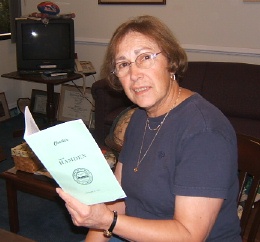
Councilwoman Noble with charter in hand. Photo/Sharon Bass
Hamden Republicans are bucking for change; Hamden Democrats are not
By Sharon Bass
Republican Councilman Ron Gambardella called for a Town Charter review.
Democratic Council President Al Gorman heard the call. Tuesday evening he appointed three members to a Charter Revision Exploratory Committee to see what -- if anything -- should be altered in the 29-page document crafted in 1983, which sets the rules under which the local government runs.
But Gorman said he’d keep an open mind. “In all fairness if there is something we can do to improve it or amend it other than rewriting it, that’s what we should do,” he said.
Bottom line, a charter revision -- at least this year in this town -- is strictly a partisan issue. Republicans say they want it in order to add provisions to guarantee more elected seats to the minority party and to include public referendums on the budget. For the most part, Democrats say they are fine with how the document reads.
On the current Town Council, Republicans hold just the two charter-mandated seats. The other 13 are filled by Democrats.
Messages left yesterday for Council Republicans Gambardella and Betty Wetmore were not returned. However, click here for Gambardella's "Second Opinion" column about charter revision.
Council minority leader Wetmore, Democratic majority leader Matt Fitch and Democratic president pro tem Carol Noble were chosen for the temporary committee. They expect to start meeting next month and present their conclusions to the full legislative body early next year. If the decision is to alter the charter, a commission of councilmembers and residents would be formed.
“It’s not something I have a huge passion for which is good because I don’t have an ax to grind either way,” said Fitch. “ It’s a pretty small document. But on the other hand we don’t have a lot of issues with it. But we’ll see. I haven’t heard of any great concerns one or way or the other.”
However, Noble feels the charter could use some tweaking. For one thing, the Department of Welfare and the Water Pollution Control Authority no longer exist. The state took over all welfare and Hamden sold its water pollution operation to New Haven.
“Those are two glaring outdated things in there that shouldn’t be there,” she said.
Noble also wants to examine the need and purpose of the mayoral appointed positions. And to possibly make the charter language clearer and more defined.
“Language, you can twist and turn to your benefit,” she said. “Working on language is a very complicated task. One little word inserted into a sentence can change the whole meaning or intent.”
Doesn’t Cut It
Gorman said the stuff Noble pointed out wouldn’t justify charter surgery.
“That’s not worth opening up the whole thing for,” he said. “That’s like opening up Pandora’s Box to clean up the language. This is a political ploy. But we’re going to take a look at it.”
The charter guarantees two Council seats for the minority party through the at-large voting rule. Each party can run a max of four candidates and the top six vote-grabbers are elected.
Gambardella has told this reporter he wants to amend that rule to mandate more guaranteed seats for minority party candidates, regardless of their vote tally.
“It bothers me a little bit,” said Fitch. “I think there needs to be minority presence. I think the concept of loyal opposition is important. It isn’t working great now when you have someone on the Council who was elected with 19 percent of the vote.”
Said Gorman, “This is not something the Democrats are pushing by any means. Maybe we should eliminate the minority representation altogether. The opposite could happen [the two guaranteed seats could be deleted from the charter]” under a charter revision.
“Another aspect they’re pushing for is doing more referendums. And that’s not a good idea,” Gorman said. “Our town is just too big. A referendum suits small towns where more of the people know each other.”
He said making budget decisions by popular vote could hurt local educational funding. “Older residents would vote for a smaller budget. They paid for their children’s education and now they feel strongly this is one way spending can be controlled,” said Gorman. “You open up referendums and you get [only] the people interested to get out to vote. It sounds great but it doesn’t necessarily serve the community.”
“You have to be careful,” said Noble. “You don’t want it to favor any political party or other influential group. It has to be neutral. That’s very important.”
Still, Gorman maintained the 1983 document is not broken. “The charter works fine. There is balance between the Legislative Council and mayor,” he said. “If other parties can’t make it at the polls, charter revision is not the answer. That’s the ultimate test. At the polls.”
September 6, 2006
Uh, Oh
Lawyers for the Dadio Farm developer taking town to court
By Sharon Bass
With no discussion, the Council passed the motion to authorize the town to acquire by sale or eminent domain the 11.8 acres off Putnam Avenue known as the Dadio Farm. The administration’s plan is to build a firehouse on the property to replace the crumbling one on Circular Avenue and possibly other municipal buildings.
Smith’s client, JPI Apartment Development in Irving, Texas, owns the rights to build 284 units on the farm, but the town denied the application. JPI appealed in court. This past spring, a judge ruled the town could not stop the development, of which some would be considered affordable apartments.
Most think the housing project is a bad idea. It would strain the municipal and school budgets and create traffic congestion, they say. Thirteen councilpeople voted to acquire the property, Mike Germano voted against it and John Flanagan abstained.
And Smith said he’s going to New Haven Superior Court “as soon as possible.”
From the letter he handed to Parise, addressed to the mayor and Council:
“We are writing to apprise the Mayor, the Council, and the public that, if the Town proceeds with condemnation/eminent domain, JPI will respond immediately with an action in court for an injunction and money damages. Allegations of eminent domain abuse and illegality are likely to be based on violations of the Takings Clause of the Fifth Amendment to the U.S. Constitution; the Takings Clause of the Connecticut Constitution; … the federal Civil Rights Act; the federal Fair Housing Act; the Due Process Clauses of the U.S. and Connecticut Constitutions; Connecticut’s eminent domain statutes; Connecticut’s affordable housing statutes; Connecticut’s Freedom of Information Act; and common law principles of tortious interference with business expectancies. The Town should also consider whether the use of eminent domain at this time – plainly in response to the Superior Court’s recent affordable housing ruling – may constitute contempt of court.
“If the Council and the Town proceed with eminent domain, JPI will move expeditiously to present these allegations to the courts.
Very truly yours,
(signature)
Timothy S. Hollister"
The appraised value of the farm with land-use permits in place is $4.9 million, the mayor said. But it's unclear what it will actually cost to pay off JPI and the Dadio family. Stay tuned.
----------------------------------------------------------------
Story and photos by Sharon Bass
It’s doubtful anyone was surprised last night when the Legislative Council voted down the idea to phase in the 2005 property revaluations. The Henrici Administration made it clear for months it was against the idea. And just two of the 15 Council members, the Republicans, voiced unwavering support for it.
Voices rose. People grew emotional. Members of the nascent Hamden Homeowners for Tax Relief group trailed each other to the mic to tell the legislative body that they desperately need the tax-relief. Some councilpeople kept getting up and down from their seats. Others apologized for not having looked more seriously into a phase-in before the budget and mil rate were determined in May. Now, they say, it’s too late.
Councilman Mike Germano said a mistake was made “but unfortunately we have to go with it.” The audience groaned.
“You know, when there’s a mistake in war people die in vain,” said Sandy Friday of HHTR. “Please don’t let the Hamden taxpayers down.”
“I’ve come to these meetings and all you do is represent the Democratic machine,” said Jan Barber who identified as a Democrat. “You’re representing the mayor, the machine and his rich friends and you don’t give a sh*t about the rest of us.”
President Al Gorman asked people to watch their language.
The Council also heard from Tax Collector Barbara Tito, Tax Assessor Jim Clynes, Finance Director Mike Betz and the mayor’s chief aide Scott Jackson. They echoed the message that a phase-in would be extremely difficult to do, would be disruptive, take a lot of manpower, there are no guarantees it would do the trick and, besides, the current antiquated computer system couldn't handle it. Tax bills have gone out. Payments have come in. And it would all have to be done again.
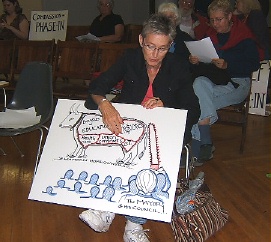
Sandy Friday with cow chart.
“I know it’s going to be a long evening so I’ll keep it brief,” said Jackson, the mayor's mouthpiece. “The administration’s view hasn’t changed.” Behind him were 30-40 residents, many holding signs begging for a phase-in.
Finance Chair Curt Leng called each of his “expert witnesses” to the podium, first asking them to state how long they’ve been in their current position and then to describe the mechanics of implementing a phase-in nearly four months after the new mil rate of 27.95 was set.
Since 1988, said Clynes. “Any information I’m going to give you tonight is going to be unbiased,” he said, based on state statute. He talked about the work that would have to be done if a phase-in was enacted, which would mean a different mil rate, which would mean a change in everyone’s taxes, which would mean new property and motor vehicle tax bills would have to be created and mailed out.
Clynes also said the amount of money the state gives Hamden for tax-exempt properties (called payment in lieu of taxes or PILOT) -- churches, colleges, private schools and state-owned buildings -- would decrease some.
And elderly and veteran tax deductions would have to be recalculated. “That takes us three to four working days,” he said.
He said the town's outdated Munis computer system lacks the ability to process a mil-rate change midstream.
“The way this is designed, once the mil rate is put in place it can’t be changed,” said Clynes. “That’s what I’ve been told.”
“Twenty-five years and counting,” said Tito taking the podium. “There’s a tremendous amount that goes behind the scenes” to ensure tax bills are accurate. She said the 1980 phase-in (Hamden’s last and possibly only) was OK to do because it was put in place before the mil rate was set. She said she would basically have to redo all the tax bills, send them to the printer and proof samples before the new statements could be issued.
The tax collector said she sent out 43,193 motor vehicle bills in July, which would all increase with a phase-in. In order to meet the current $163.6 million municipal budget, the mil rate would have to go up to compensate for the lower property tax bills some owners would get with a phase-in. Some would see higher bills, especially high-end property owners like businesses. But the higher and lower bills wouldn’t cancel each other out. The tax rate would have to be hiked.
“It is very important that the process is transparent to the taxpayer,” said Tito. “I’m concerned there are many variables and unforeseeable problems [with a phase-in].”
Jackson returned to the podium, appearing slightly distressed. “I’m not here to tell you what you want to hear, but the truth,” he said, tacking on his disgust with being “called a liar in the press.”
The impact of a phase-in is unknown, he said. He likened it to a scene from the movie “Ghostbusters.” Representatives from the Environmental Protection Agency and ConEd visit the ghost busters’ firehouse headquarters to shut down the containment grid -- where the busters store the ghosts they trap. No one knew what the consequences would be of letting the ghosts free (citywide havoc ensued), just like no one knows what the consequences would be of phasing in the reval, said Jackson.
Mark Sanders of HHTR addressed the Council. He had devised his own three-year phase-in, which he earlier submitted to the town. He said taxpayers would save $10.1 million under it.
“Tonight we learned a lot about the problems. Some make sense, some don’t,” he said. “This will be messy. We’re not going to deny that. But with fine public servants [Tito, Clynes, Betz, Jackson] with tons of experience” a phase-in can be done.
“This is what the Bushies do -- soak the poor for the benefit of the rich,” said Barbara Schlein, another HHTR member.
“I’m here to speak against the [phase-in],” said Don Werner of Mix Avenue. “These folks [Tito, Clynes, Betz, Jackson] have done a tremendous job. I think it’s wrong to start working off the grand list” to cut taxes, he said. Instead, tax relief should come from decreased spending.
“I suggest that all these fine people [HHTR members] attend the town and Board of Education [budget deliberations in the spring]. They have to get involved in the process early on,” said Werner.
Upon Leng's suggestion, the Finance Committee approved passing the motion to the full Council, which convened at about 10 p.m.
The Council Opines
Republicans Ron Gambardella and Betty Wetmore were the only ones at the bench to speak in favor of a phase-in. Gambardella shot batteries of questions at Tito, Clynes, Betz and Jackson. Councilman Curt Leng later called it “cross-examining.”
“You can’t take anything at face value,” said Gambardella. “You have to dig and dig. The administration concluded behind closed doors this wasn’t an important enough issue to bring to the Council. Here we are sitting two, three hours, so I guess it is an important issue.”
“I do believe the administration let us down,” said Wetmore. “That’s not saying I don’t shoulder the blame. When I vote here, I vote my conscience. I feel this phase-in will help the people of Hamden. We should have done it in April. This is not political for me. I don’t care if you vote for me.”
Some observers have claimed the leaders of the phase-in movement -- on and off the Council -- were doing so for political gain.
Leng had originally supported the idea but then changed his mind. “I don’t think at this point we can competently do this,” he said. Leng commended Craig Henrici for being the first mayor to advocate replacing the Munis system, expected to be completed early next year.
“We have failed in compassion for our fellow citizens,” said Councilwoman Kath Schomaker. “We have been swayed by politics rather than policies. It’s not a proud moment for Hamden.”
“I have kept a very open mind about the phase-in,” said Councilwoman Gretchen Callahan. “I regret not being able to vote for this tonight. The administration has made it very clear, along with our tax collector and tax assessor,” that it can’t be done.
“It’s clear to me we’d lose out on PILOT money and the administration has made it clear it can’t be done,” said Councilman Mike Colaiacovo. Councilman Matt Fitch estimated the loss would be about $300,000 from the expected $3.4 million the town should get this year.
At least one councilperson had no regrets or apologies. “I’m not embarrassed about what we did,” said John Flanagan. “We did our job in the spring. [A phase-in] doesn’t work.”
“I will say that this town is on a roll,” said Councilwoman Carol Noble. “You may not see it because you’re not in Town Hall every day or every other day as we are. We have the best tax collection rate in the state. We have some of the finest town workers. I’d like to see more people here [in April] when we’re here night after night” making the budget.
“I don’t think this was in vain,” said Gorman of the phase-in attempt. “It’s not something we will forget.”
And then they voted.
Roll Call
Are you in favor of implementing a property revaluation phase-in (paraphrased from the actual motion)?
Bob Westervelt, No
Mike Germano, No
Mike Colaiacovo, No
Curt Leng, No
Kath Schomaker, abstained
Carol Noble, No
Matt Fitch, No
Betty Wetmore, Yes
Ron Gambardella, Yes
Curt Leng, No
Gretchen Callahan, No
Willie Mewborn, No
Jim Pascarella, No
Berita Rowe-Lewis, No
John Flanagan, No
No surprises.
Oh, Dadio
Round 3 in the fight to stop Residential Development down at the farm
By Sharon Bass
Tonight will mark the third time the Dadio Farm dilemma goes before the Legislative Council. Nobody, not neighbors or elected officials, thinks it’s a good idea to allow a Texas developer build 284 apartments on the weedy land off Putnam Avenue. Well, nobody except the Texan.
The town earlier turned down the project, but in late spring a judge ruled for the developer. The Council is now being asked to approve $4.9 million to rescue the land.
The money would be split between the Dadio family and JPI, which owns the development rights. But it’s likely the 12-acre farm will have to be taken by eminent domain, since JPI refused to accept a court-suggested $4.2 million settlement just several months ago. It's holding out for more.
“It’s a strategic piece of property to put a fire station, to house an ambulance, so it has an obvious public use the town has been considering for some time, which is a requirement of eminent domain,” said Mayor Craig Henrici. “And there’s a question whether Putnam Avenue can handle such a development.” Opponents have cited increased traffic, more students in the school system and other financial strains on the town as reasons to kill the project.
Irving, Texas-based JPI did not respond to several requests for comment.
Been There, Done That
In July 2005, the Council approved buying or taking the farm by eminent domain -- the same motion it’ll take up again tonight. The appraised value as just farmland was $1.5 million, but with land-use approvals that figure shot up to $4.9, said Council President Al Gorman.
The Planning & Zoning Commission had denied JPI’s plan. The developer appealed it in Superior Court, where a judge ruled in late spring that the commission was wrong and JPI could develop. The judge then made the $4.2 million suggestion.
Councilmembers sounded amenable to doing whatever it takes to keep the developer away.
“I’m afraid this is the only way we can go since the developer doesn’t want to negotiate any longer,” said Gorman. “The judge was anxious for the parties to come to an agreement. And we did. Now [JPI] decides for whatever reason they don’t want to accept the dollar amount.”
“I think it’s a good idea,” said 9th District Councilman Bob Westervelt. “I don’t think we need any more housing in town, especially apartments.” He said the farm is the “perfect” location -- close to Whitney and Dixwell -- for a new firehouse to replace the aging one on Circular Avenue. Tonight the Council will also vote on whether to spend $75,000 to repair the Circular station.
Second District Councilman John Flanagan said it will take some time before a new firehouse is built, so putting 75 grand into the ailing station is not a waste of money.
He said he’s also in favor of the $4.9 million item. “I haven’t seen the documentation yet but overall I think it’s a good idea,” he said. “[JPI’s plan was] not going to [attract] seniors. It’s more than likely families with kids moving in. And for each kid it’s $10,000.”
Henrici said he didn’t know how much it will cost to go the eminent domain route, but it will exceed five million. However, in the long run it will be cheaper than bringing 284 new families into Hamden, he said.
“Obviously we’re going to overpay. [The land] is ready to go. The judge ruled that P&Z doesn’t have the right to stop them,” said Gorman. “Here’s the opportunity. We can avoid the strain on the school system. This is a starting point to get it Council approved and start serious negotiations with these people [JPI].
“The only bad thing about this is if we take it by eminent domain it has to be used as public use,” said Gorman. The town’s plan for the farm includes selling parcels to the abutting Hamden Industrial Park, which would be private use.
----------------------------------------------------------------
"Craig B. Henrici
Mayor
August 31, 2006
Legislative Council
Hamden, CT 06518
Honorable Members:
It has come to my attention that the Legislative Council intends to discuss a “Phase-In” Resolution at its meeting on September 5, 2006.
Every individual who owns a motor vehicle would pay more in taxes for that vehicle, eating directly into any savings achieved on residential property. Any senior or recent college graduate who rents a unit would pay higher taxes to the Town of Hamden under a phase-in.
In addition to the disparate impact that a phase-in would have on Hamden residents, implementation of a mid-year phase-in would also cause additional damage to the Town’s 2006-2007 budget. The State of Connecticut’s Office of Policy Management has confirmed that any effort to implement a mid-year phase in would result in decreased State PILOT payments and grants, which are based upon appraised values townwide. As the operating budget is already established, the burden of any decrease in State aid would fall squarely on the shoulders of our local residents in the form of increased tax share.
This is one of the items that makes implementation of a mid-year phase-in dangerous, difficult, and fraught with unintended consequences. The impact of such an implementation on items such as state aid and elderly tax credits have not been effectively analyzed by phase-in proponents. Homeowners with mortgages who pay their property taxes through funds escrowed with their mortgagor will be subject to the vagaries of that mortgagor’s escrow analysis mechanisms, so the impact of a mid-year phase-in on these families cannot be effectively calculated and analyzed. Hundreds of taxpayers who have paid their real estate property taxes in full will be due a refund with interest. Every motor vehicle owner will receive a supplemental bill. The cost of these mailings and manual re-processing of these and other unanticipated items will go far beyond what has been budgeted and likely require funds from the Town’s Emergency & Contingency account.
The Legislative Council has already heard the shortcomings of the Town’s financial system, particularly its tax and assessment package. An upgrade of that system is currently underway and will be fully in-place [sic] and tested by the beginning of the next budget period. One need only look at our neighboring community of West Haven to see the critical importance of detailed system testing prior to implementation of any tax and assessment software.
Hamden’s budget process, guided by experience and Town Charter, begins in January of each year. The Administration turns its proposed budget over to the Legislative Council in March. Following the passage of a final budget by the Council, the Mayor makes a number of certifications to the state while the Town’s Tax Assessor and Tax Collector engage in an extremely complex, behind-the-scenes process that ultimately results in the deliver of tax bills on July 1. From prorating veterans’ benefits for properties that have sold to processing hundreds of Certificates of Correction, the steps between establishment of a mill rate by Legislative Council and delivery of tax bills requires [sic] a collaborative effort that must be clear, well-informed, and established with appropriate timelines in mind.
Consideration of phase-in is well suited to the budget process. It is ill-suited for discussion after the setting of the mill rate and passage of the budget because of the mutual dependencies built into the process.
Thank you for your consideration of this additional information. Finance Director Mike Betz, Chief Assessor Jim Clynes, and Tax Collector Barbara Tito will be available at the meeting to respond to any questions you may have.
Sincerely,
(signature)
Craig B. Henrici, Mayor
CBH:sdj"
‘I’ve Been Blessed’

Benjamin Wydra, 5, pins the chief.
Story and photos by Sharon Bass
Fourteen of the 16 recently promoted male cops were sworn in last night on the Hamden High auditorium stage (two couldn’t make it). After opening remarks by town officials and the singing of the national anthem, the men were pinned by a wife, a mother, a father or a child.
Chief Tom Wydra and Deputy Chiefs John Cappiello and Bo Kicak -- the new top brass -- briefly addressed the audience promising to uphold the law with dignity and pride, and then choked on words and fought back tears when they thanked their wives.
“We’ve become a very young department in a short time,” said Wydra, 35, who was made chief on July 5, and is the youngest-ever to helm the Hamden police force. “I encourage all in our department to move forward with an open mind.”
Then he thanked his wife, Mindi, and his voice broke. “I’ve been blessed with a lot of support throughout my life,” he said.


Deputy Chiefs Cappiello and Kicak get pinned by their sons.
“I would like to thank my wife, Michele,” said Cappiello, tearing up. “I’d like to give a special thanks to my parents.”
“I would like to thank my family who stood by me,” said Kicak, “especially my wife. For me this has been and continues to be a very rewarding career.”
Wydra said Mindi has supported his career goals and keeps his ego in check. “I’m not chief at home,” he said. He spoke of the 14 block watches in town and how the HPD works well with the schools, Quinnipiac University and state and federal law enforcers.
But his No. 1 message was the need for a new headquarters. “This is by far our greatest need,” said the chief. Earlier, Police Commission Chair Elliot Kerzner made the same plea.
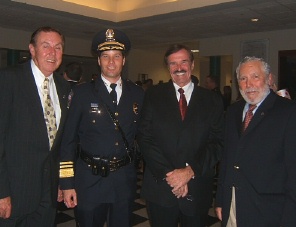
Nolan, Wydra, Kennelly and Ambrogio.
Wydra’s last three predecessors -- Jack Kennelly, Bob Nolan and John Ambrogio -- witnessed the ceremony. So did cops from North Haven, West Haven, Milford and Fairfield; Hamden police commissioners; town employees; and mothers, fathers, grandparents, children and wives.
“I’m very proud of all these fine, fine police officers,” said Kennelly, who retired June 30 after 35 years in the HPD. “I know they’re going to continue to bring the department forward in a positive and progressive manner.”
Ambrogio was a Hamden cop for 42 years, the last 24 as chief. He hired Tom Wydra 14 years ago as a rookie cop.
“I think he’ll do an excellent job. He’s a very bright young man,” Ambrogio said. “It brings back loads of memories. It’s very comforting to know the department is in good hands.”
Keeping it simple, refreshments consisted of two items: coffee and Danish, aka big, fancy donuts without the hole.
Who Was Made What
Tom Wydra, chief
John Cappiello, deputy chief
Bo Kicak, deputy chief
Ron Smith, captain
Gabe Lupo, lieutenant
Michael McNeil, lieutenant
Kevin Samperi, lieutenant
Lyle Bennett, sergeant
Michael Doherty, sergeant
David Ng, sergeant
Frank Riehl, sergeant
Michael Sigmon, sergeant
John Sullivan, sergeant
Colin Kearns, detective
Scott Levenduski, detective
Stephen Rossacci, detective
----------------------------------------------------------------
Kroop Looking For Takers

A HUD-rehabbed home in Highwood. Courtesy photo
By Sharon Bass
Most town department heads scramble for dough. Dale Kroop is an exception. He’s looking for stuff to spend it on.
“We have all this other money we want to spend,” the Economic Development director said. He’s talking about federal block grants, which are earmarked for specific projects. They can’t be thrown into the general fund.
This year, Hamden got $519,669 from the Department of Housing and Urban Development, down from over $620,000 five years ago. The loot goes to fixing up the town’s southern neighborhoods: Highwood, a small portion of Hamden Plains and State Street. It also helps feed social service tills.
“It’s really not much more complicated than quality of life,” said Kroop, who recently took over the block-grant program. “Why should a child in Highwood live in a less healthy environment than a child somewhere else in town, when we can do something about it? We help low- and moderate-income working-class families in Hamden and this is what the money is for.”
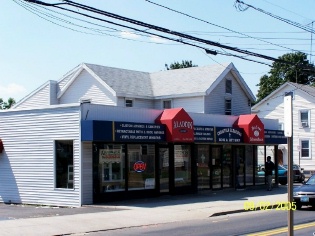
This Highwood commercial property was revitalized with federal dough. Courtesy photo
These block grants fund residential and commercial rehabs; sidewalk, street and other infrastructure repairs; landscaping; business signs; awnings; emergency housing; a local fair rent project; and public service agencies such as domestic violence efforts and legal aid.
A few years ago, an elevator was installed in the Keefe Community Center with HUD dollars. Recently, $38,000 went to establish a lead-free shelter at 191 Butler St. Another $1,000 a month is going to the homeowner to rent her first-floor apartment to shelter one family at a time whose house is being remediated of lead or other toxins.
“We’ve done such a good job marketing the [block grant] program that we’re now looking for projects,” said Kroop. The word gets out primarily through the media and public meetings. He said getting the federal money saves local tax revenue, which would otherwise have to be used for some of these projects.
HUD pays part of Kroop’s and new grant coordinator Chris Marchand’s salary. There used to be a full-time director for the block-grant program. John Post was the last director. The mayor’s Chief Administrative Officer Scott Jackson had the job before him. And Councilman Curt Leng did it prior to Jackson. Their entire pay came from HUD. When Marchand was hired this July, Post’s position was eliminated and absorbed by Kroop’s department.
For more information, e-mail Kroop.
Site designed by Joanne Kittredge

Tip Us Off
Send
news tips



